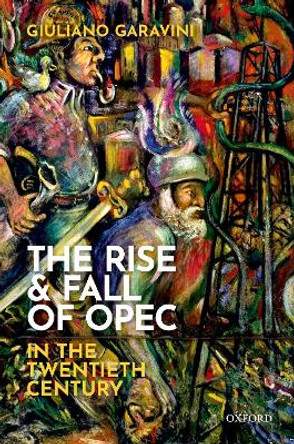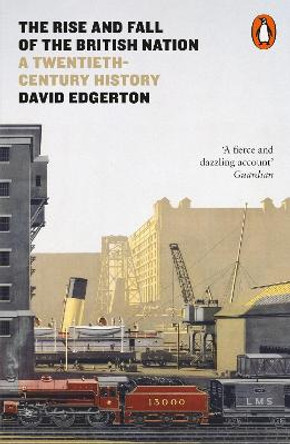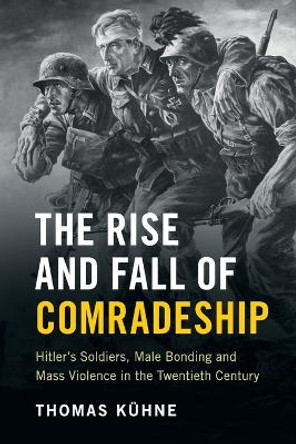Description
About the Author
Giuliano Garavini teaches International History at Roma Tre University in Rome. His main research interests include European integration, decolonization, and global struggles over natural resources. He has taught classes at various universities and institutions, including the Graduate Institute in Geneva, the European University Institute in Florence, and NYU Abu Dhabi. He has published on the interconnection between European integration and decolonization (After Empires, 2012), and on the global history of petroleum and of energy, in particular on the origins and significance of the 1973 'oil shock' (Oil Shock: The 1973 Crisis and its Economic Legacy, 2016) and on the 'counter-shock' in 1986 (Counter-Shock: The Oil Counter-Revolution of the 1980s, 2018).
Reviews
This point, however, only underscores the richness of Garavini's book; it delivers even more than it claims to offer. Garavini does not deny that oil and the wealth derived from it have sometimes facilitated destructive decisions by the members of OPEC. But he balances this common narrative of dysfunctional petrostates with a well-researched and -reasoned historical account demonstrating that petrostates have also been unsung champions of redressing global economic inequality and environmental degradation. The Rise and Fall of OPEC is required reading for anyone who wants to understand the global impacts of oil and the role of the Global South in shaping its use during the twentieth century. * David Wight, H-Net: Humanities and Social Sciences Online *
Garavini's rich history starts with the emergence of petroleum-producing countries in the 1920s and covers the establishment of the Organization of Petroleum Exporting Countries in the 1960s, the oil shocks of the 1970s, and OPEC's declining ability to control prices in the 1980s and 1990s ... Although Garavini's account ends at the turn of the twenty-first century, many of the themes he sounds are strikingly contemporary: tension between Iran and Saudi Arabia, dysfunction in Venezuela, and the need for oil-producing and oil-consuming countries to think about the coming transition to a global economy that no longer relies on fossil fuels. * Barry Eichengreen, Foreign Affairs *
Despite the international importance that it achieved, especially in the 1970s, the Organization of Oil Exporting Countries (OEPC) has been relatively neglected in terms of serious scholarship. Giuliano Garavini's monumental study goes a long way to rectify this omission ... Garavini has provided a highly readable account that will be of interest not merely to economic historians but also scholars of diplomacy and international relations. * Simon C. Smith, Journal of Modern History *
offers a refreshing account of an organization that has managed to adapt to radically. * Edoardo Campanella, Project Syndacate *
Based on extensive multilingual research, including sources that were previously inaccessible to historians, this book is the best history of the Organization of the Petroleum Exporting Countries (OPEC) yet published. * Victor Mc Farland, Environmental History *
a well-needed and important contribution to the growing body of literature on the history of oil and energy that aims to transcend the confines of an American and European perspective. * Rudiger Graf, ARO *
It is rare to see a book on oil history that takes on the challenge of developing a truly global analysis while at the same time going into local depth when it comes to the oil histories of individual countries. * Per Hoegselius, The Journal of European Economic History *
The author traces the history and influence of OPEC from its for-mation to its downfall in the late 1980s and early 1990s. * Survival: Global Politics and Strategy *
The Rise and Fall of OPEC is a masterful book that contradicts the well-worn but essentialist understandings of oil as the root of authoritarianism, Middle East wars or environmental catastrophe. * Journal of Colonialism and Colonial History *
Garavini does much more than simply set the record straight. He reorients our view of the international organization away from the overblown and exaggerated accounts of oil-weapon-wielding-sovereigns holding the West hostage. * Robert Vitalis *
Garavini's book is more than a history of OPEC, "one of the most recognizable acronyms in the world" (9). It aspires to be a global history of oil's role in shaping the twentieth century. * Gregory Brew *
The Rise and Fall of OPEC in the Twentieth Century is an outstanding contribution to the international history of the twentieth century and deserves a wide audience. * David Painter *
This is not just a book about oil markets, the economy, and the oil industry. Scholars of energy and geopolitics will find a succinct and focused analysis of the development of Organization of the Petroleum Exporting Countries (OPEC) 'petrostates,' the organization itself and the role it played the economic and political development of the twentieth century. * Ellen R. Wald *
The thesis of The Rise and Fall of OPEC is that the international cooperation among petrostates has constituted one of the most powerful drivers of the international history of the 20th Century * Adriana Castagnoli, Il Sole 24 Ore [translated] *
Garavini's study [is] an essential source for those who have an interest in the history of OPEC and oil-producing countries, providing unprecedented details in a book that is incredibly well researched and updated. * The International Spectator *
No book about oil and the world economy has had more of an impact than Daniel Yergin's 1990 masterpiece The Prize [...] It may not get its own miniseries, but Giuliano Garavini's Rise and Fall of OPEC in the Twentieth Century is no less groundbreaking for its subject. * Michael Franczak, Cold War History *
Garavini has made an important contribution to the history of the oil resource ... The author's courage to pursue a large number of actors over a long period of time leads to a complex narrative that will be the reference to OPEC's history for the foreseeable future... * Clemens Huemeriehner, Sehepunkte *
convincing history of the organization * Jonas Kreienbaum, Historical Institute, University Rostock *
Garavini's book is well researched and full of interesting details. * Gerald Butt, Petroleum Economist *
... a unique look into the organisation's internal decision-making... detailed and carefully researched book... a corrective to western-centric accounts of the organisation and an essential read for those trying to understand the forces that built the modern energy world and the Middle East... also a reminder that tacticians and strategists of a high calibre will be needed to lead Opec into its seventh decade. * Robin Mills, The National *
For any scholar interested in the history of energy and petroleum, oil and gas development, energy market development and petroleum studies more broadly, the academic thrill and writing finesse in perusing the chapter of this book is unprecedented. The author, a top-notch historian on energy and petroleum history, presents a well-researched and detailed account... capitvating and a rich source of broad, detailed and deep knowledge... * Energy *
... a welcome addition to the literature ...[Garavini] leverages the previously unavailable minutes of OPEC conferences ... as well as his deep expertise about and clear passion for the subject, to pen a fresh account, full of enduring lessons for today, of the history of the world's most prolific oil organizations ... Vital reading for historians of oil and anyone interested in political economy or the Middle East. * John Bowlus, Energy-Reporters.com *
... the emphasis on environmental aspects is a further innovative element of this book, which is too often overlooked in OPEC's historiography. Garavini's text highlights how concerns and overconsumption in industrialised countries and the exhaustion of natural resources becomes crucial already after the turning point of 1973 - and are still essential today. * Flavio Fusco, The International Spectator *
The impressive list of consulted archives is perhaps the most obvious strength of the book ... Overall ... Offers an assured history of the organisation [...] with special credit given to the impressive width of sources. * H/Soz/Kult *
The meticulous reconstruction that Garavini makes of the events inside the individual petrostats and their intertwining with the strategies of the companies and government policies is commendable and compelling. * Il Fattoquotidiano (translated from Italian) *
Book Information
ISBN 9780198832836
Author Giuliano Garavini
Format Hardback
Page Count 436
Imprint Oxford University Press
Publisher Oxford University Press
Weight(grams) 1g
Dimensions(mm) 242mm * 164mm * 28mm





